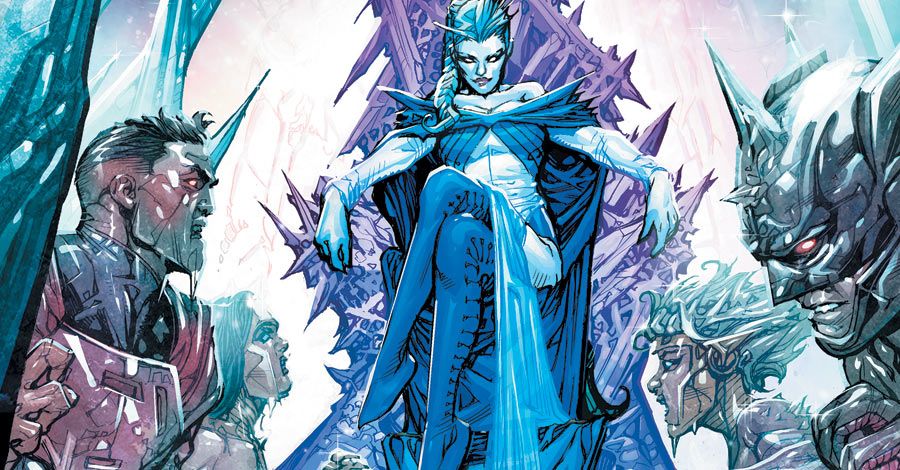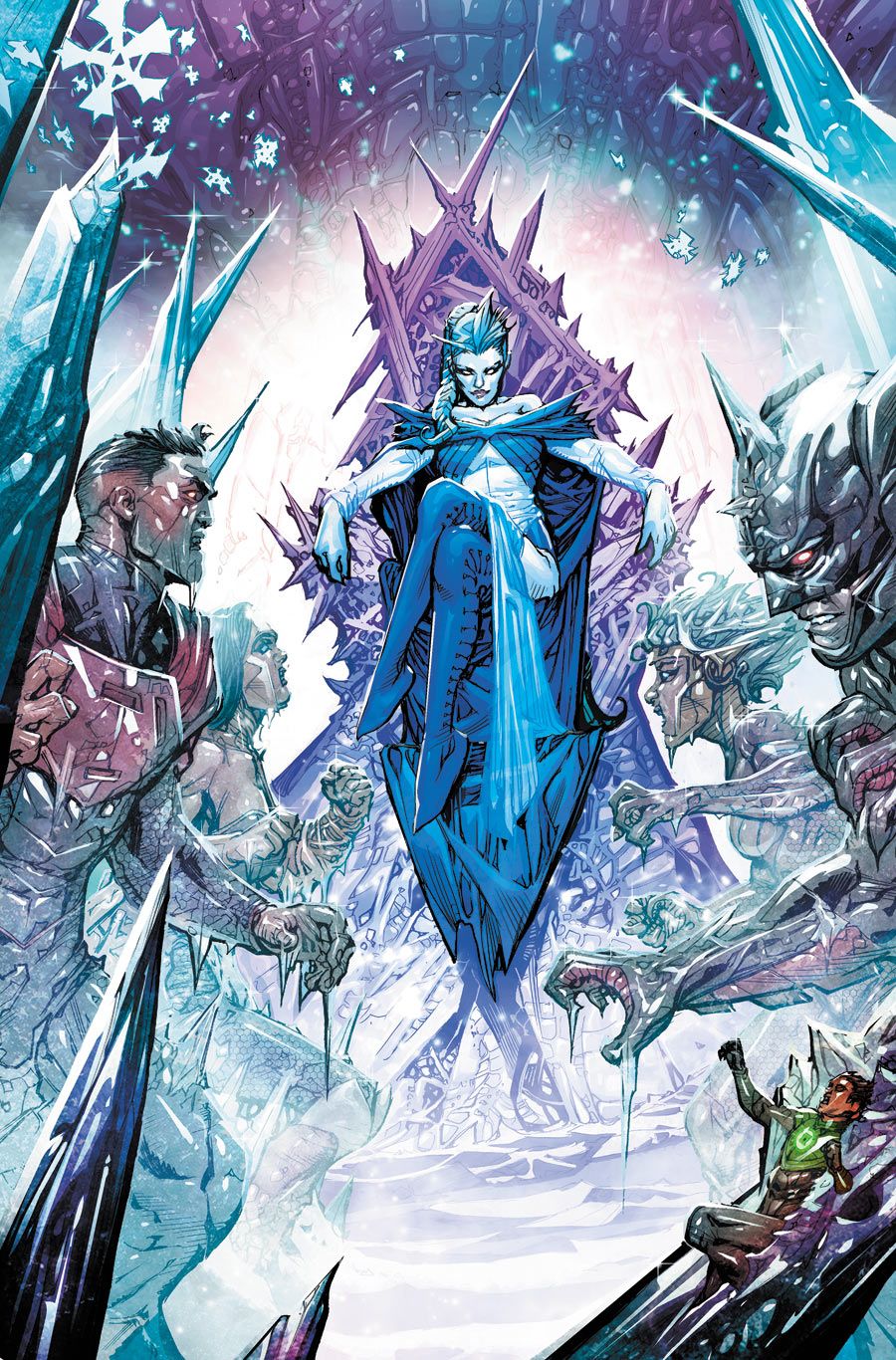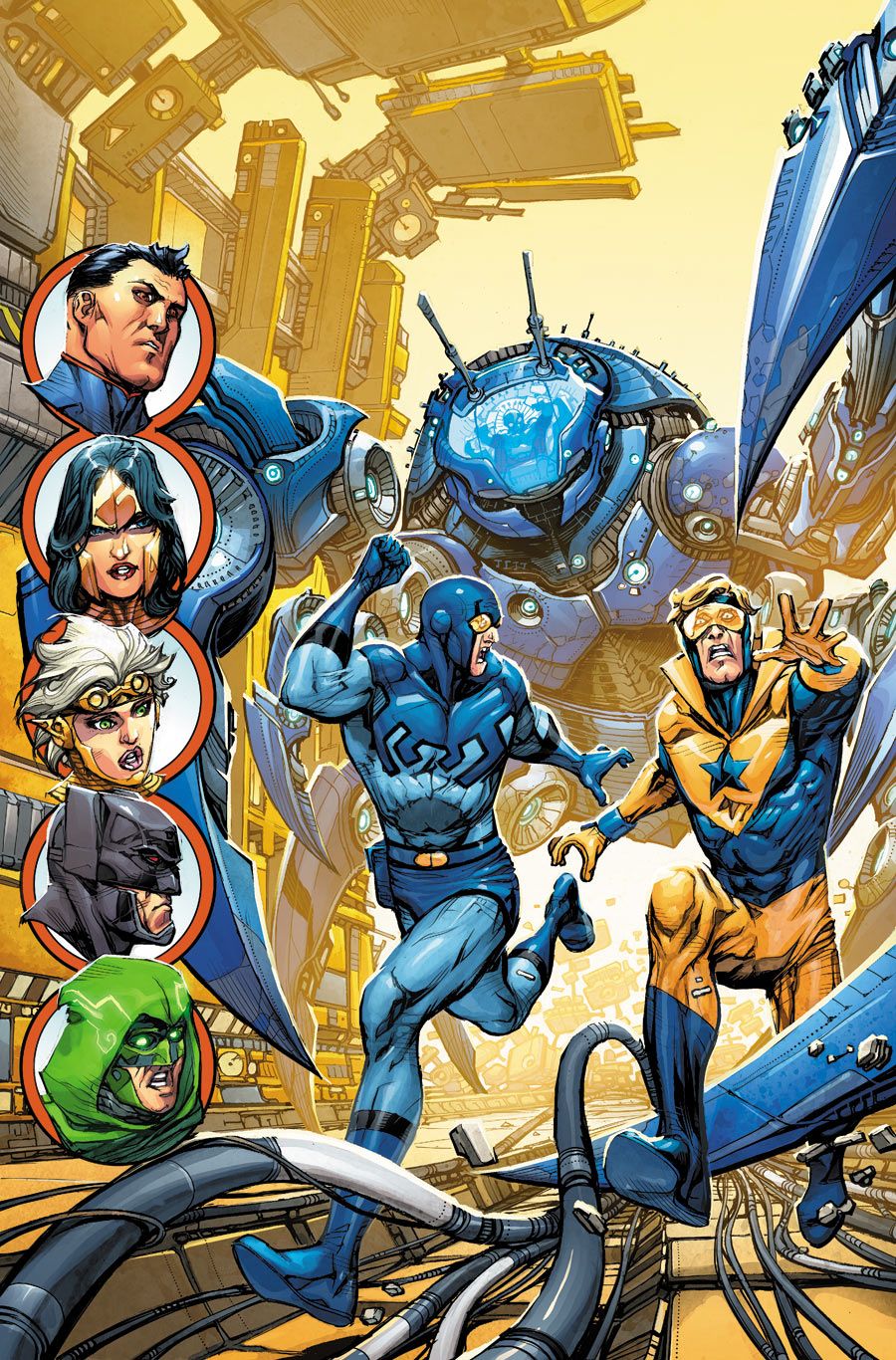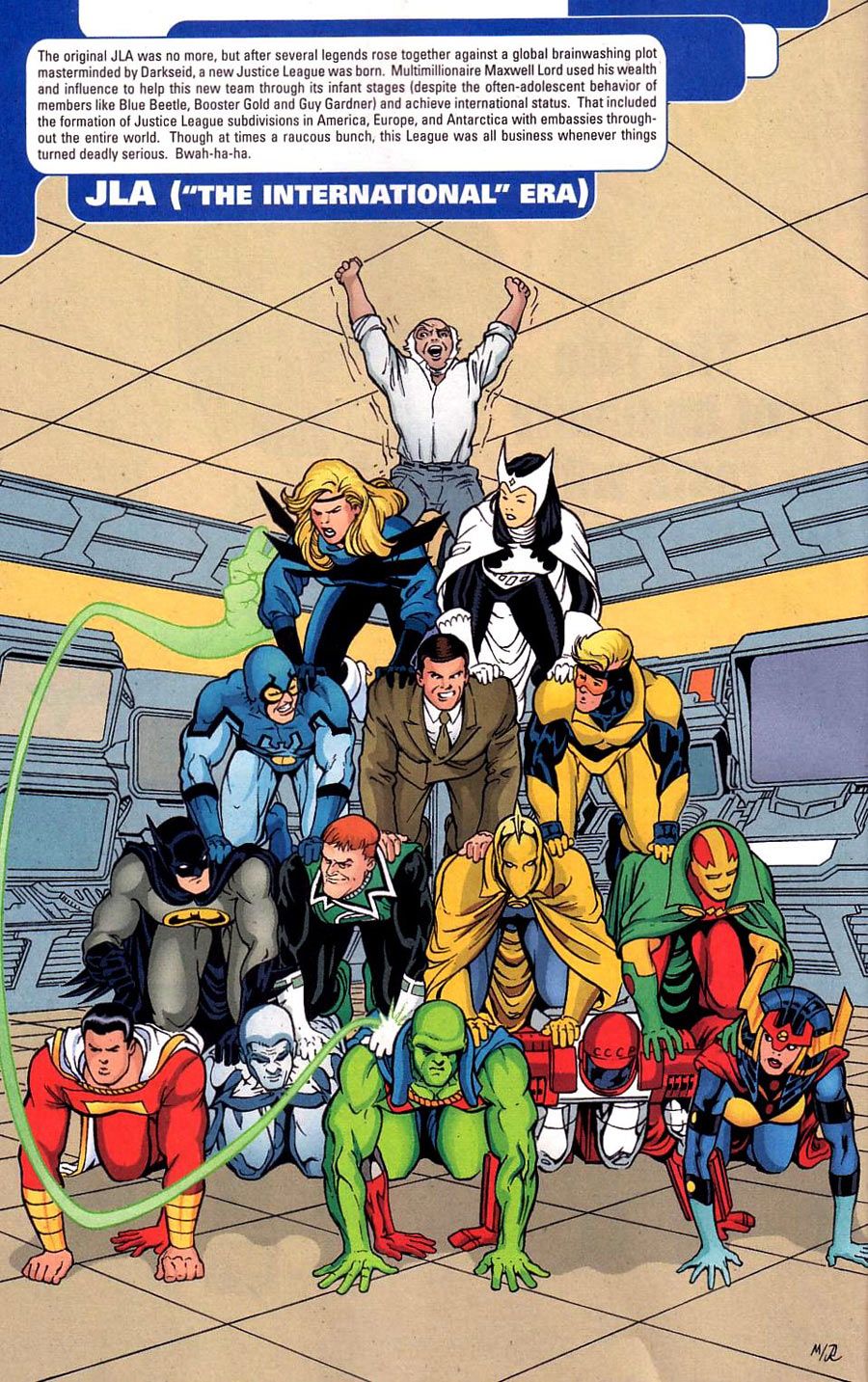"Justice League 3000" stands very much alone in the DCU. Keith Giffen, J.M. DeMatteis and Howard Porter's future-shifted series takes place 1000 years in the future, staring very different incarnations of the DC Universe's heaviest hitters. But though it's never been marketed as such, it may not take place in the same timeline as the New 52.
Coming up in "Justice League 3000" #12 are some very special guest stars: Booster Gold and Blue Beetle, straight from Giffen and DeMatteis' fan-favorite, bwa-ha-ha-filled "Justice League International." Joining Booster and Beetle in January are Fire and Ice. As a genuine goddess, Ice has been around the DCU for quite some time when the future Justice League encounters her, so perhaps her interactions with the clones of her former teammates may offer some clues as to which corner of the Multiverse the series resides in.
RELATED: Giffen & DeMatteis' Booster Gold & Blue Beetle Set For "Justice League 3000"
During our discussion about the JLI/JL3K connective tissue, Giffen shared some of the in-story motivation for adding some old friends to the cast as well as the behind-the-scenes impetus for the book's new direction. He also opened up on the current state of mainstream superhero comics and how that has affected the creative team's approach to the series.
CBR News: Keith, before we get to Ice and Fire, I want to discuss the slowly increasing connection between "Justice League 3000" and "Justice League International." Was it the plan from the very beginning to bring in these elements from your original "Justice League" run?
Keith Giffen: No, not at all. The original idea was just to get a "Justice League 3000" book out there. Our initial fight was to get our characters through with their personalities the way they are -- Superman's a douchebag, the Flash was our Kenny -- that was the initial fight. Once we got through that, as the stories progressed, I just kept thinking, "What would no one expect? What would be the weirdest thing I could do in this book? ... Beetle and Booster in a refrigerator."
We're bringing Beetle and Booster back, and yes, I'll say it again: It's really them, it's not a trick. In a year from now, I'm not going to be going, "Ha ha! I gotcha!" No, this is the same characters from "I Can't Believe It's Not the Justice League" book that ends with "They all lived bwa-ha-happily ever after." This is a direct sequel to that.
So, this is Booster and Beetle living bwa-ha-happily ever after.
If they do, yes. But you can figure shortly after that, something happened. They wound up cryogenically frozen. Once we get them settled in, we have Ice come in. When Ice comes in, you know Fire can't be far behind.
Well, tell us a bit about Booster and Beetle before we get into Fire and Ice. These are characters that you really helped define. What was it like for you to get back into writing them in the context of "JL3K?"
I was actually concerned about that. What if I've progressed past what the characters are? In other words, I know what the fans like about the characters -- am I still in that place? And I've discovered it was the easiest issue I've ever plotted. Howard just clicked into what makes the characters work -- his art is amazing. We just stepped into it. It was almost like putting on a really comfortable sweatshirt. It's got a couple of frayed holes, it's a bit baggy around the shoulders, but man, is it comfortable.
We had so much fun with Beetle and Booster -- and it was actually a toss up, by the way, as to who was in the refrigerator. It was either going to be Beetle and Booster or Fire and Ice. I couldn't get Fire and Ice out of my head, so since I pretty much hijacked the book and said, "Hey, it's my universe! Go away!" Why not?
A lot of people forget that Ice is an ice goddess, and last time I checked, goddesses live a long fucking time.
This version of Ice is the original, then.
Yep. It's Tora. And Bea is there.
They'll be characters in the book -- right now, I'm looking at them as to how the Inhumans were to the Fantastic Four. These are characters who will support the main book. I don't see these guys immediately running out and joining the Justice League. They'll interact with the Justice League like Silver Surfer used to interact with the Fantastic Four.
I've got plans for [them]. In fact, we give away our plans in a Channel 52 two-page spread. Our two-page spread will freak a lot of people out because we pretty much lay it out -- "Here's what we're doing!" The cool thing is, since it's in the DC Channel 52 thing, it'll be in all the DC books. Maybe there's some guy who has no idea what we're doing in "Justice League 3000" and maybe he'll be curious enough to pick it up.
That was the idea with Beetle and Booster -- putting them on the cover. I just thought, "I'm tired of keeping secrets. I'm tired of having something that I think could attract attention, and being hush-hush about it until it's out, and it's too late!" Because when it's out, they've already ordered the copies. They're out there. That's how many copies you sold. If putting Beetle and Booster in the book gets a few people to come over and buy some issues of "Justice League 3000" that might not have, I'm sticking them on the cover. When I turned Teri into the Flash, I stuck her on the cover!
I don't think we're doing ourselves any favors by picking the stuff we hope will excite the fans and keeping it a deep dark secret. "Oh, won't they be surprised to find out that the Silver Surfer comes back! If only we could tell them!" Well, we can tell them, and they'll buy the book! That's really self-defeating and I'm not going to do it any more.
It seems like you're having a lot of fun writing and promoting "Justice League 3000." With that in mind, how do you feel the way comics and comic promotion has changed since you were writing "Justice League" back in the day?
Asses have tightened. That's probably the best way to put it.
Although, I will admit -- I don't want to offend anybody. Let's just say that when I was doing "Justice League," we had a bunch of editors who understood that not every book has to be the same tone, not every book has to have the same basic rhythm, you can carve your own place. Don't worry about continuity, the fans will figure it out -- they do it so much better than us! -- and we'll just follow their lead. We told our stories, and the story was important.
We weren't constantly being yanked into a special event every two minutes. That's why I'm glad I'm 1000 years in the future [in "Justice League 3000"]. "What are you going to do five years later?" "Screw you, I'm 1000 years later!" We had more room -- let's put it that way.
Don't get me wrong, they still hammered us -- "Take the humor out, it'll be a better book!" was a cry throughout our tenure on "Justice League." But there was a tolerance that I think has been -- not completely lost, but it's not as prevalent as it used to be. You had to fight really hard to get a book with a different tenor out there. I'm looking at some of the books coming out right now and I'm very heartened by what I see. "Silver Surfer" -- Mike Allred drawing "Silver Surfer"? I never thought I'd see the day, but boy is that a nice book. It's a charming little book. The way they've redone "Batgirl" -- and my current favorite comic book, "Gotham Academy." Becky Cloonan should be the most sought-after writer in the business. That is such a wonderful book! Never mind if it's for girls or guys or whatever, it's just a good book. It's full of interesting characters that made me want to know more.
There's a loosening up, and this is kind of current, at both companies in terms of what each company considers a comic, which is a ridiculous thing to say, because a comic is basically what sells. That's a good comic. Dick Giordano hated, hated, hated Lobo -- hated the character, hated the book -- hated him. But he understood that Lobo was a popular character, not his cup of tea, so he wasn't constantly after me to change and conform to his way.
That was, for a while, the way comics were being run. If the editor didn't like the direction a book was going, it didn't matter how well it sold -- they'd get in there and start pinching and tweaking and fucking it up. But lately -- and I know this for a fact, I've talked to people who actually make these decisions -- it's loosening up. It's really loosening up. They're actually saying, "You know what? You're always saying, 'If I was left alone, I would do this and this and this. I'd make this book popular.' Fine. The shackles are off. Go."
I love that. I absolutely love that. I think if you're willing to go after it, I think comics are loosening up a little bit; the way they approach the market, the kind of stories they're doing, the kind of characters they're willing to put in their books. This is just, I'd say, within the last year that I'm feeling this. A couple of years before that -- as soon as last year -- they were pretty horrible.
That's pretty recent -- when the shackles started to come off, is that when you started to --
Yes. Yes. The minute I realized, "Oh my God, they mean it!" I said, "Why don't we bring Beetle and Booster back?" And they said, "Okay." I thought, "Oh, wow, they didn't take a swing at me. I don't feel like a wac-a-mole." I went, "Well, I'm also going to say it's not the New 52 universe -- it's going to be a whole different universe." They said, "Okay."
So now, it's up to me to make it work. And if the book dies an agonizing death, they'll turn to me and go, "Ha ha! Mister know-it-all -- what do you got next?" Maybe I'll beat my head, maybe I'll back off and say, "Okay, I missed the zeitgeist. Let's work together." But basically, they're giving us the opportunity to fail.
How has that opened up "Justice League 3000" for you?
Well, I don't feel I have to ask permission for every little thing. How do I put this -- let's talk two or three years ago. I'd very aware of what I'm putting in the book and second guessing [what] would be yanked out. So I'd put something else in there, never knowing if my original idea would have gotten through. I started trying to sneak stuff through, and some stuff got through, but lately, it's been, "Go for it." Really.
In a way, it's what we've always been talking about, isn't it? Okay, a lot of people will say, "Of course, that's you." But you know what? I'm not that great shakes. I work in the field like everybody else. I have books that succeed, I have books that fail. So, if you have a story that you want to tell, as long as it's not a bad story or one you'd get sued for, give it a shot! Go for it!
But if it fails, keep one thing in mind -- if it's done your way and you're allowed to explore new things, you've got nobody to blame but yourself. You can't turn around and say, "Oh, the editor screwed it up." You can't do that, then. To me, it's euphoric, but it's also kind of frightening because if "Justice League 3000" falls flat on its face and dies, then I've got to re-think the way I'm approaching comic books. I'd have to rethink a lot of stuff.
In terms of the actual introduction of Ice and Fire -- what are the Justice League in for when they encounter Ice? How does Fire play into it? Ice might be a Goddess, but Fire's not.
I don't want to give away too much, but let's just say that Ice has been -- let's call it preserving Fire. Some 30th Century science will have to be used to get Fire back, but we do know how she can still be alive and valid in the future. No, we're not going to use the same process we used to create the Justice League. She's not going to be one of those.
Ice is easy. She's an ice goddess. She's spent the last thousand years trying to be left alone. She's watched everyone she cares for die, and now she just wants to be left alone. But, of course, she's got all these powers. People won't leave her alone.
The way the Justice League [3000] reacts to her is interesting, because it's different from the way the Justice League would react to her. My Justice League, they're kind of damaged. I mean, Green Lantern might go, "Who, what? I don't remember any Tora." So, the ones that recognize one another right off the bat -- Wonder Woman just looks at her and goes, "Tora?" And she looks at Wonder Woman and says, "Diana?" Because they're goddesses! Well, one of them is a pseudo-goddess, so I figured they would know.
But the fun in bringing characters like Beetle and Booster and Fire and Ice into the book is that they come with their full set of memories, whereas the Justice League -- Superman, Batman, Green Lantern and Wonder Woman -- their memories are sketchy. They don't remember everything the way it was. Superman, I'll tell you right now, he doesn't recognize Ice at all. And I know that Superman was never a member of her Justice League, but if we're talking superhero community, trust me -- they've met.
It's finding ways to insert the characters that work within the very broad internal logic the comics established.
It's really interesting that you've got all these old favorites coming back. What can you tease about any other different DCU characters or concepts you're hoping to introduce in upcoming issues now that you have this creative freedom?
Well, everybody [has creative freedom]. From what I can gather, from what I understand, if the story passes muster, you will be able to tell it.
I don't want "Justice League 3000" to be the book that people pick up and say, "Who next? Who next?" I've got these characters, now it's time to start throwing new characters in there, have them start bouncing off new characters, new villains, new missions -- get them settled in. Because right now, I just finished up issue #13, and I'm starting on 14. I have quite a big cast to juggle. Aside from the Justice League themselves, I've got Terry and Konvert still at Cadmus and all the Cadmus people. I've got the Injustice League -- all those different characters to introduce and send against our Justice League. Now I've got four more characters -- so, it's like a delicate balancing act. I don't want to lose track of Justice League 3000 in their own book.
As much as I love Beetle and Booster; or Fire and Ice, or this or that and the next thing, I don't want, "When do we see J'onn J'onzz?" or "When do we see this guy?" I don't know. I don't know if you'll ever see them. If a story comes along, fine, but "Justice League 3000" isn't going to be, "I wonder who they'll mess around with this month." That's not what the book is.
We'll have a period here where we introduce a lot of new characters, some not so-old-characters in new situations. Now, it's time to explore them a little more before we move on to the next thing. We have definite plans for -- I could probably, without sitting down and coming up with everything new, just based on where we know we're going and what I've discussed with Mark and Howard up to this point -- I could probably run for another three years easy, just on what we got stockpiled.
The weird thing is, just because I have it stockpiled doesn't mean it's going to happen. I might be in love with a story today, but who knows? This time next year, something better might come along. If I got hit by a bus tomorrow, there's enough that "Justice League 3000" could run off of the ideas for at least three years -- which is pretty cool.
Before I let you go, I wanted to ask a bit about "New 52: Futures End." It's about halfway through now, what are you and the rest of the creative team looking towards for the back half of the series?
Paying off all the foreshadowing that's been done for the first half of the series.
I suppose -- and props to Brian Azzarello for putting this bug in my ear and for bringing this up -- for a while, I was a little at sea as to what I was going to do with the character of Fifty Sue and where Grifter would wind up when this is done. Now I know, I have a good idea, and I'm kind of excited to get to that. I like the idea that there will be life in these characters still even when I walk away from the book. Of course, Grifter's been out for ages, but a lot of the characters I thought would just end will be around for a while. For the Fifty Sue thing, like I said, I have to give Brian Azzarello the nod. Not a lot of people realize, but it was Brian Azzarello who came up with that name.
I'm sure he meant it jokingly, but unfortunately, he said it out loud in front of me.
Anything else you'd like to add?
All I'll say is that if you're interested in a book out there that's coming out on a monthly basis, and you decide, "I'll wait for the trade," you have every right to do that. But you have no right to complain when it doesn't make it to the point where it's going to get a trade.
I'm not going to say to people, "Buy it monthly! Don't wait for the trade! How dare you!" because they vote with their dollar. If you like a book and the book is kind of shaky -- I'm not going to use names, we all know books that are kind of shaky -- if you really like the book, then support it. If you have been supporting it, keep supporting it. The only thing that stops a book from going away is the readers, the fans.
You can write on the Internet until you bruise your fingers. You can write about how many people love this book -- "No, don't cancel it!" -- but if you're not buying it, then that's all they're going to listen to. They're not going to keep the book around because PrancingPony485 out of Schenectady likes it. Ultimately, our goal -- and most people don't like to bring this up -- is to make money. Make money for DC, DC makes money for Warner Bros. If the book doesn't make money, it'll go away. It doesn't matter how good, bad or indifferent the book is. If it's not selling, it'll go away.
Too many people come up to me with a trade paperback or something and say, "Wow, this is a great book! Why don't you do this any more?" Why is any book not published anymore? People weren't buying it. That's the answer to any book on the market that has ever been cancelled.




